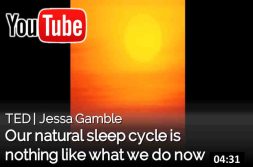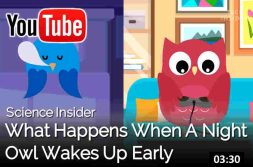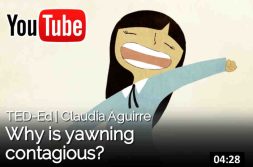Sleep
Questions
1. Do you always get enough sleep?
2. Have you ever had any problems sleeping?
3. Are you a heavy or light sleeper?
4. Do you move about a lot in your sleep?
5. What do you do in the minutes before you sleep?
6. What do you do when you can’t sleep?
7. Would you like to sleep like a baby?
8. Do you think sleep wastes valuable time?
Videos
In today’s world, balancing school, work, kids and more, most of us can only hope for the recommended eight hours of sleep. Examining the science behind our body’s internal clock, Jessa Gamble reveals the surprising and
[more]
substantial program of rest we should be observing.
[less]
Category: Science
There is a lot of advice out there about how to get the best night of sleep. But the fact that you can’t sleep might not be your fault. It turns out, night owls have an internal clock that functions differently. Forcing them to wake
[more]
up early could have serious health consequences.
[less]
Category: Psychology
In the United States, it’s estimated that 30 percent of adults and 66 percent of adolescents are regularly sleep-deprived. This isn’t just a minor inconvenience: staying awake can cause serious bodily harm. Claudia Aguirre
[more]
shows what happens to your body and brain when you skip sleep.
Lesson by Claudia Aguirre, animation by TED-Ed.
Lesson by Claudia Aguirre, animation by TED-Ed.
[less]
Category: Psychology
Look alive, you! Today we’re diving into the science behind dark circles under your eyes, and all the things that might cause them – tiredness included.
Category: Science
*Yaaawwwwwn* Did just reading the word make you feel like yawning yourself? Known as contagious yawning, the reasons behind this phenomenon have been attributed to both the physiological and psychological. It’s
[more]
been observed in children as young as four and even in dogs! Claudia Aguirre visits the many intriguing theories that might explain contagious yawning.
Lesson by Claudia Aguirre, animation by TED-Ed.
Lesson by Claudia Aguirre, animation by TED-Ed.
[less]
Category: Science




